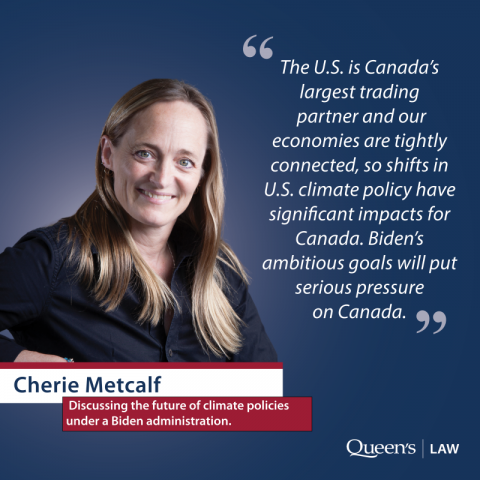
With the Biden inauguration dominating international news, six Queen’s Law experts are stating their predictions for how the new government will have an impact on Canada and across the globe. In this first of a six-part series, Professor Cherie Metcalf examines climate policy.
Driving the climate change fight creates challenges for Canada
The incoming Biden administration has signaled a U-turn in U.S. climate policy with implications for Canada and the world.
Under President Donald Trump, the U.S. withdrew from the international Paris Agreement to limit global warming to 1.5 degrees. This agreement, that the U.S. helped engineer, is a vital step to avoiding catastrophic effects from climate change. As one of the world’s largest economies and emitters of greenhouse gases (GHGs), the U.S. can help drive its success.
Instead, under Trump the U.S. pursued short-term gains by promoting its own coal, oil, and gas industries. The U.S. actively weakened its emissions standards, pushed forward with the Keystone pipeline, and removed climate change impacts as a factor under its National Environmental Policy Act (NEPA) assessment regime, among numerous other actions. In the dying days of the administration, Trump rushed to auction off leases opening up the pristine Arctic National Wildlife Reserve to oil and gas development.
In sharp contrast, incoming President Joe Biden has promised to rejoin the Paris Agreement, convene an international climate summit in his first 100 days, block the Keystone pipeline project, and most ambitiously commit the U.S. to Net Zero emissions by 2050. Biden’s plans for this energy shift include promoting the U.S. economy and creating new jobs. To advance that goal, “carbon border adjustments” are planned for imports from countries with weaker regulations.
The U.S. is Canada’s largest trading partner and our economies are tightly connected, so shifts in U.S. climate policy have significant impacts for Canada. Biden’s ambitious goals will put serious pressure on Canada.
Biden’s policy supports Canada’s new more aggressive approach to GHG reduction. The dramatic increases planned for the national carbon price under the Greenhouse Gas Pollution Pricing Act are the kind of action required, if the new Biden administration is able to advance its plans. While the constitutionality of that Act is being decided by the Supreme Court, ultimately some way for Canada to align with the U.S. will be needed. The U.S. retreat from oil-and-gas-friendly policy will definitely disadvantage regions like Alberta, where the industry is a key economic driver. Biden’s proposed climate policies make it more likely Canada will meet our Paris Agreement targets, but with consequences.
At a global level, U.S. re-commitment to the Paris Agreement is a good thing. However, the dramatic shifts in policy have harmed U.S. credibility and left other nations to take the lead. The Biden administration will have to demonstrate its renewed resolve. Days ago, NASA found 2020 tied for the earth’s hottest year on record … with 2016. Welcome back to the global climate change fight, President Biden!
Professor Cherie Metcalf specializes in law and economics, international environmental and resource law, public law, and constitutional law. She is the recipient of an Insight Grant from the Social Sciences and Humanities Research Council of Canada for her project on “Institutions for Effective Climate Change Action” and a grant from the Canadian Foundation for Legal Research for her project on “Climate Change and Canada’s Constitution.”
Over each of the next five days, watch for stories featuring our experts’ outlook on immigration and refugee law, trade policy, tax reform, foreign policy, and international criminal justice.